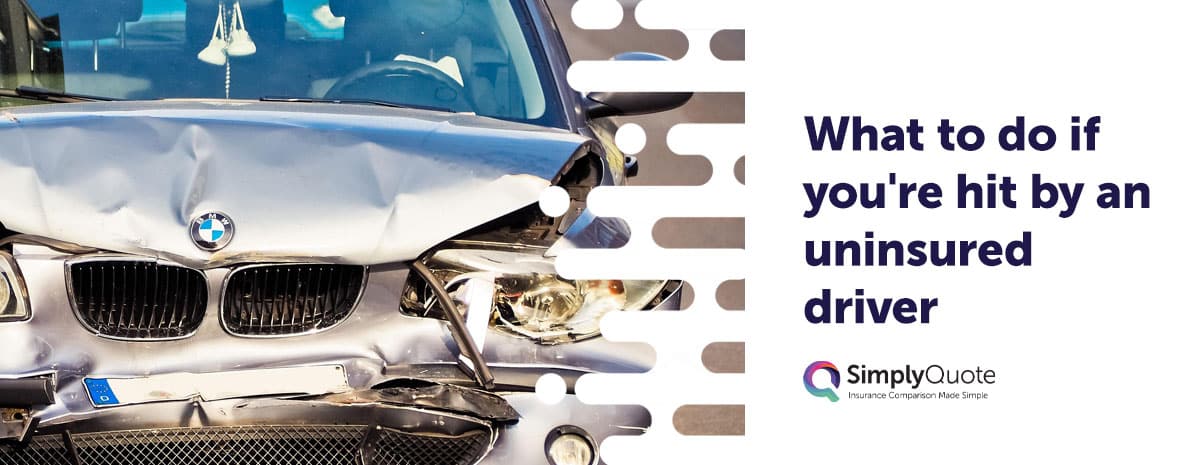What to do if you’re hit by an uninsured driver
If you’re hit by a driver without insurance, you should stay calm, gather as much information as possible, and report the incident to both the police and your insurer.
The rest depends on your cover and whether the other driver can be identified.
Accidents are stressful at the best of times—but discovering the other party has no insurance adds another layer of frustration. It might leave you wondering who pays for the damage, whether your insurer will help, or if you’ll be left footing the bill for something that wasn’t your fault.
The good news: UK law provides a route for compensation even when the other driver is uninsured or disappears entirely. It’s not always instant, and there’s paperwork involved—but it’s possible.
This guide explains what to do step by step—from gathering evidence and reporting the incident to understanding what your insurer or the Motor Insurers’ Bureau (MIB) can do to help. Whether the other driver owns up or drives off, you’ll know your options—and your rights.

What should you do immediately after the accident?
If you’re hit by an uninsured driver, prioritise safety, collect evidence, and report the incident to the police—especially if the other party refuses to provide details.
The more information you gather now, the stronger your case later.
First, check everyone’s safe. If there are injuries or the road is blocked, call 999. If not, move to a safe position and stay calm. Don’t argue with the other driver—even if they admit to having no insurance. Just focus on documenting everything.
You’re legally allowed to ask for the other driver’s details, including:
- Full name and address
- Vehicle registration
- Make and model
- Insurance provider (if any)
If they refuse, note down the registration plate and description of the vehicle. Take photos of the damage, the scene, road markings, and any relevant signage. These will be vital if the other driver disappears or disputes the incident later.
Speak to any witnesses. Ask for their name and contact number—your insurer or the Motor Insurers’ Bureau may need to verify what happened.
A driver reverses into your car in a supermarket car park, then admits he’s uninsured. You take photos of the damage and his number plate, and a nearby shopper agrees to act as a witness. You’ve just protected your claim—even if he drives off.
Looking to compare car insurance? Get your quote today!
Get QuotesHow should you report an accident involving an uninsured driver?
You should report the incident to the police if the other driver is uninsured, refuses to give their details, or leaves the scene—and always notify your insurer, even if you’re not making a claim.
If the other driver admits to having no insurance, or you suspect it, call 101 as soon as it’s safe to do so. If they’ve left the scene or become aggressive, report it immediately—this is a criminal offence. Get a crime reference number, as you may need it for an MIB claim or for your insurer’s records.
Then contact your insurer. Even if you don’t plan to claim, most policies require you to inform them of any accident, especially if someone else may report it later. You can usually do this through an app or online portal, but a call may be better if the situation is complex.
Be factual, not speculative. Stick to the details you’ve collected—photos, witness names, location, and time. If the driver was uncooperative or drove away, say so clearly.
What happens if you have comprehensive insurance?
If you have comprehensive cover, your insurer may pay for the damage—but whether you’re fully protected depends on whether your policy includes an uninsured driver promise.
In a typical scenario, your insurer will cover your repair costs after the accident, but you’ll still be expected to pay the policy excess upfront. And unless your policy includes specific protection, you might also lose your no-claims bonus, even if the uninsured driver was at fault.
That’s where an uninsured driver promise makes a difference.
Some insurers include this feature as standard; others offer it as an optional extra. It usually guarantees that:
- You won’t lose your no-claims bonus
- You’ll get your excess reimbursed
- Your premium won’t increase due to the claim
You’re hit by an uninsured driver while parked. Insurer A includes an uninsured driver promise—they refund your £250 excess and protect your NCB. Insurer B doesn’t—you’re out of pocket and your NCB drops by a year.
It’s worth checking your policy terms or asking your insurer directly. The label “comprehensive” doesn’t always mean comprehensive in these situations.
Can you claim compensation through the MIB?
Yes—if you’re hit by an uninsured or untraceable driver, you can claim compensation through the Motor Insurers’ Bureau (MIB).
This scheme exists to help victims in exactly this situation and is funded by UK insurers.
The MIB handles claims where the at-fault driver:
- Has no insurance
- Left the scene and can’t be identified
- Is foreign and uninsured while driving in the UK
You can apply directly through the MIB website, and there’s no cost to submit a claim. You’ll need to provide as much evidence as possible—photos, witness statements, police reports, and repair estimates. The stronger your documentation, the smoother the process.
The MIB can cover:
- Vehicle repair or replacement
- Medical costs and injury compensation
- Loss of earnings (in some cases)
- Other out-of-pocket expenses related to the crash
Quick reference:
| Covered by MIB | Not Covered |
|---|---|
| Damage from uninsured drivers | Minor damage without evidence |
| Hit-and-run injuries | Losses where no police report exists |
| Vehicle damage (with proof) | Delayed claims outside time limits |
Claims can take weeks or even months to resolve, but for those with no other option, the MIB offers a crucial route to justice.
Do you need legal support for an MIB claim?
You don’t need a solicitor to make a claim through the MIB, but legal advice can help—especially in complex cases or where injuries are involved.
Most straightforward claims can be submitted directly online without legal representation.
The MIB process is designed to be accessible to the public. If you’ve got clear evidence and the circumstances are simple—such as damage to a parked car with witnesses or photographic proof—you may not need legal help at all. The claim forms walk you through each stage, and you can submit supporting documents digitally.
But if your case involves:
- Personal injury
- A dispute over fault
- Loss of earnings
- Difficulty proving the uninsured driver caused the damage
…then a solicitor may be worth speaking to. Some law firms specialise in uninsured driver claims and offer no win, no fee terms.
Legal expenses cover may already be included in your car insurance policy. If so, it could help cover solicitor fees, even if you aren’t claiming directly through your insurer.
For many, the right choice is to start the claim alone and only seek legal advice if complications arise.
What happens if the other driver can’t be found?
If the driver who hit you leaves the scene or gives false details, you can still claim compensation through the MIB as long as you report the incident to the police.
These are known as “untraced driver” claims.
This applies in cases like:
- A hit-and-run where the driver speeds off
- Someone gives fake contact details or a false name
- No vehicle registration can be confirmed
The MIB handles these differently to uninsured driver claims. You’ll need to report the crash to the police within 14 days for injury claims, and ideally within 5 days for property damage. You must obtain a crime reference number, or the MIB won’t progress the claim.
In place of an insurance policy number or driver details, the MIB will assess the strength of your evidence:
- Dashcam footage
- Witness statements
- Scene photographs
- A clear timeline of events
These claims often take longer and require more verification, but they can still result in compensation—especially if you’re injured or the damage is significant.
How can you protect yourself from uninsured drivers in future?
You can reduce your risk by choosing insurance with an uninsured driver promise, installing a dashcam, and being aware of where and how you park or drive.
While you can’t control other drivers, you can put safeguards in place.
Start with your policy. Not all comprehensive insurance includes an uninsured driver promise—some offer it only as an optional extra. If you want to understand what’s available, review your car insurance policy options here. This feature protects your no-claims bonus and covers your excess if you’re hit by someone without insurance and can identify them. If it’s not part of your current plan, ask your provider or consider it when you renew.
Next, fit a dashcam. High-definition front (and ideally rear) cameras can record what happens on the road, back up your version of events, and support both insurance and MIB claims. Some insurers even offer discounts for having one installed.
And finally, think about exposure. Statistically, uninsured drivers are more common in urban areas, especially where car ownership is high and enforcement is stretched. If possible, park in well-lit areas or under CCTV, and drive defensively at junctions and roundabouts—two common points of impact in uninsured driver cases.
You can’t eliminate the risk entirely—but with the right tools, cover, and awareness, you can limit its impact.
Final thoughts
Being hit by an uninsured driver isn’t just frustrating—it can feel unfair. But there are systems in place to protect you, and compensation is still possible if you take the right steps.
Your actions in the minutes after a crash matter. Document the scene, report the incident properly, and keep a clear record of everything that happened. Whether you’re dealing with your insurer or the Motor Insurers’ Bureau, the more evidence you provide, the stronger your case.
And while compensation might not be instant, it’s rarely out of reach. Most drivers are surprised to learn they’re covered—even when the other party disappears—if their insurer includes the right protection or they pursue a claim through the MIB.
The most important thing? Don’t leave it to chance. Know your policy, report promptly, and if in doubt, ask for help. You’re not alone—and you’re not powerless.
Frequently Asked Questions (FAQs)
Yes. Driving without insurance is a criminal offence. If reported to the police, the driver may face fines, penalty points, and even vehicle seizure.
Yes. The MIB accepts personal injury claims, provided you report the incident promptly and supply supporting evidence.
Not directly. However, if your insurer covers the cost and then recovers it from the MIB, it may still be logged as a claim.
Anywhere from several weeks to several months, depending on the complexity and the quality of the evidence provided.
No. It’s a non-profit organisation funded by UK insurers to compensate victims of uninsured or untraced drivers.
The MIB and your insurer will assess liability based on evidence. Dashcam footage, witness statements, and police reports can help prove fault.
Only in specific cases. The MIB may contribute to legal costs, but it’s not guaranteed. Some policies include legal expenses cover.
No. If the driver fled the scene, you can still claim as long as you reported the incident and have supporting evidence.
